
By John, Certified Holistic Health Coach
Project One-Eleven is our non-toxic home renovation project. We’re taking an old row house that’s been serving as an office and converting it back into a residence where you’ll be able to come test mattresses and other Good Stuff.
Because we’re all about the Good Stuff, we’re using non-toxic and sustainable products, materials, and processes as much as possible. We’re blogging about the process to share the joys and challenges of taking a non-toxic approach to home renovation.
When it came time to select our countertops for the kitchen at 111, we reviewed a bunch of options. As usually, we were balancing cost, non-toxicity/earth-friendliness, and aesthetic while choosing
among the following:
- Formica. While Formica itself is not considered toxic, it is almost always mounted onto particle board, which emits all sorts of undesirable VOCs. Likewise, the adhesives used to adhere Formica to the particle board is full of nasty stuff, including formaldehyde.

- Wood. There has been a resurgence in the use of wood for kitchen countertops. The industry has gone far beyond the butcher-block look that was so popular in the 1970’s, and there are some gorgeous wood countertops out there. The problem is that in order to prevent stains, mildew, and other damage to the wood, special sealers are often used…and, of course these often contain a range of toxins.

- Copper or Stainless Steel. Although these counters are non-toxic as well as visually attractive, the cost was beyond our budget.

- Tile. Ceramic or porcelain tile is a great non-toxic material, but experience has taught me that the upkeep of the grout joints is a bit of a pain. Grout joints also make countertops difficult to really keep clean, and we worried that our kitchen would look old before its time.

- Concrete. I happen to love love concrete countertops. They can be customized to create a wonderful surface. And while some of the sealers needed to keep concrete countertops in good shape can be toxic, I have used beeswax with great results for some projects. There are several other nontoxic finishes that can be found at Green Building Supply. In the end, our short timeline didn’t make concrete a good option for our project.

- Stone. For the past 20 years or so, granite has been the countertop stone choice for homeowners everywhere for good reason. It is attractive, durable, heat resistant, stain resistant, and easily maintained. Over the years the cost of some types of granite have become much more reasonable. From a toxicity viewpoint, granite only poses one potential downside: radon.

Here on the east coast, radon (the radioactive decay of radium-226) is a serious concern, and I urge you all to have the levels in your home tested. That said, there is no compelling evidence that granite countertops will significantly add to your radon load, although the studies are far from conclusive and have not been rigorous enough to rule out the possibility.
I have always been a big fan of soapstone. Geologically, it is not related to granite. It is far more resistant to heat than granite, and it is essentially impossible to stain. Unlike granite, soapstone cannot be polished to a high sheen. I am not a fan of highly polished stone countertops. They are “cold” to my eye and difficult to wipe down without leaving water marks everywhere. This is especially true of any of the darker toned granites. Soapstone only polishes to a matte finish that I happen to like.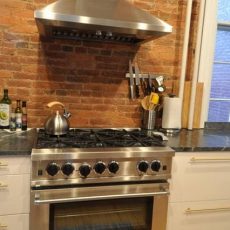
Soapstone is more expensive than most popular granites, but because it is quite soft, the labor to cut and polish it is greatly reduced, which of course saves money and time. Because of how soft it is, anyone considering a soapstone counter should feel comfortable with the nicks and scars it quickly accumulates.
I have soapstone countertops in my full-time residence, and for Project 111, we used soapstone on all the countertops except the island.
When we were at our local granite shop, we found a gorgeous piece of Quartzite (not to be confused with man-made Quartz) that was already cut and polished to the exact dimensions of our island! It had been manufactured a year earlier, to the wrong dimensions of it’s intended home. Therefore the granite shop was happy to have us haul it away for a very nice price. Quartzite can be one of the more expensive types of stone. It is also NOT granite.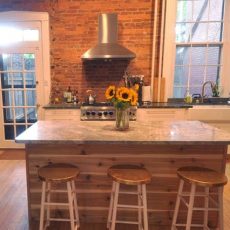
We did the installation ourselves…saving a few dollars. Don’t try it unless you have ample (wo)man-power and experience. The island was smaller than typical but Quartzite and Soapstone are very heavy. It took five strong dudes and one old guy (me) to get everything off the truck and into place.
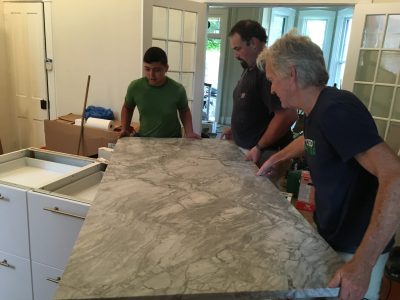
Please ask any questions about countertops below!
Stay sane,
P.S. This space is now open! Reserve your stay here and email Suzanne to make an appointment to come test mattresses or purchase select items from our store.
If you liked this post, sign up for our newsletter to be alerted when we publish new content like this!

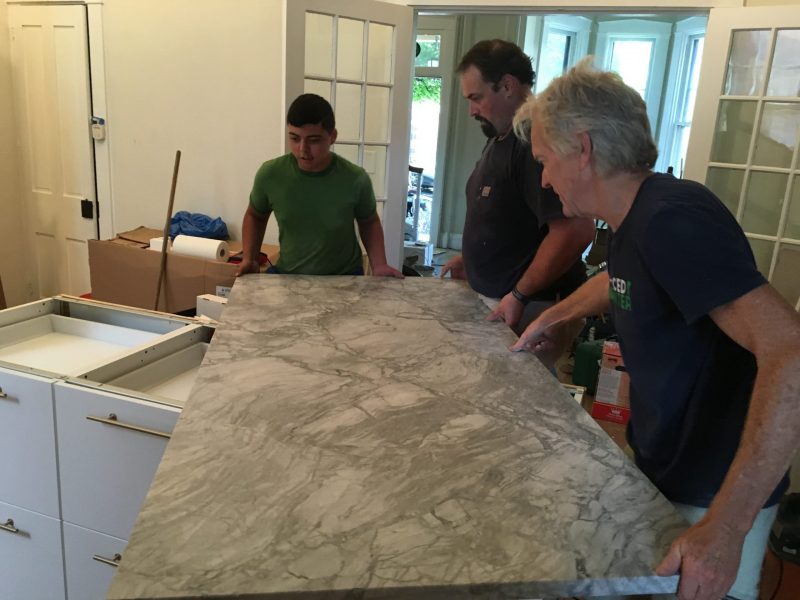
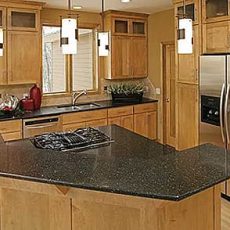

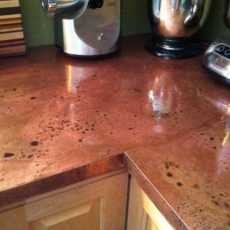
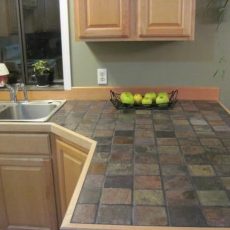
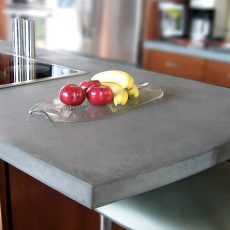
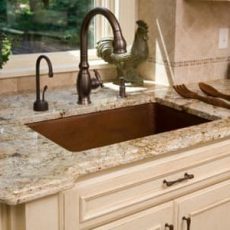


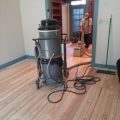




Erik Kreider says
Wouldn’t any earth-based material provide a potential source for radon, given the prevalence of radium and uranium? I’d be interested in learning what source you have that indicates that concrete, soapstone or any other stones is preferable to granite in the context of radon. Radon accumulation in homes is much more related to the naturally occurring progenitor isotopes in ground around foundations vs. building materials, and it’s generally only an issue if you have a basement because radon is denser than other gases in the atmosphere to it tends to accumulate there. I’d be willing to bet significantly that radon emission from any decorative stone is probably not worth being concerned about in the least. I’ll take granite any day and worry more about being struck by a meteor.
John Goss says
I agree Erik…as I said in the blog…
“…there is no compelling evidence that granite countertops will significantly add to your radon load…”
We stayed away from granite simply because we like soapstone and Quartzite so much more.
Adrian says
Why is quartzite less toxic than granite? And what about man-made quartz tops? Also, FYI they are now making beautiful (some even look like natural stone!) cohesive slabs of porcelain so you don’t have to deal with tiles and grout. They are pricey but beautiful!
Terry says
I would also be interested in your take on quartz. I find it odd that such a common counter top material is not included. Thanks.
John Goss says
Yes Terry,
Man-made Quartz is a glaring omission…(my bad). It is made from natural quartz and man-made resins. I will look into the toxicity of this resins and report back.
Laurel says
Any update on the toxins in quartz? I research Cambria and a few others that say they are no VOVs ???
Jourdan Clough says
Hi,
Also doesn’t soap stone contain talc? Isn’t talc toxic?
Kim Perl says
Any info on the toxicity of quartz countertops? That’s what I was looking for as well…
Katharine says
Interesting information. Wondering about the polish/cleaners for stone counter tops. I have to use one on my granite counter tops to make them look presentable. Any safe alternatives there? Perhaps how one has to care for their counter tops, as far as a polish/cleanser goes is even more important than the counter material itself?
Thank you,
K
John Goss says
Hi Katharine,
This is the best question of all and I should have addresses it in the blog.
Almost all granite cleaners/polish contain ingredients of concern. Some are worse than others but I do not know of any that is fully non-toxic. I do not, and will not, ever use them.
This, from the Natural Stone Institute…
“Clean stone surfaces with a neutral cleaner, stone soap, or a mild liquid dishwashing detergent and warm water.
Similar to any item cleaned in your home, an excessive concentration of cleaner or soap may leave a film and cause streaks. Follow manufacturer recommendations.
Use a clean rag mop on floors and a soft cloth for other surfaces for best results.
Rinse the surface thoroughly after washing with the soap solution and dry with a soft cloth.
Change the rinse water frequently.
In the bath or other wet areas, soap scum can be minimized by using a squeegee after each use. To remove soap scum, use a non-acidic soap scum remover or a solution of ammonia and water (about 1/2 cup ammonia to a gallon of water). Frequent or over-use of an ammonia solution may eventually dull the surface of some stone types.
In outdoor pool, patio or hot tub areas, flush with clear water and use mild bleach solution to remove algae or moss.”
Note that they do not recommend using a cleaner/sealer product. In my view there is zero need for these products and they are sold to us simply for monetary reasons.
In my experience these products actually cause granite to look worse than it naturally would.
I like soapstone because it requires very little care and is essentially stain proof and scorch proof.
Great question!
Laurie says
Interesting information about the different types of countertops. Thanks for sharing!
Laurel says
Hi …was curious if you ever got your information and data on the man made quartz countertops. We are building a health conscious healthy home….It was hard…our insulation in the house is made from recycled blue jeans…..It took so long we researched every single thing we put into the home. We are now on healthy counter tops..curious your opinion on the manmade quartz?
Thank you Laurel Galsso
John Goss says
Hi Laurel,
John here…
Man made stone, (quartz…not to be confused with the natural stone called quartzite), has very high amounts of silica. Silica dust is something to avoid because it can cause silicosis of the lung (very bad). The good news is that it is in the manufacturing process that silica dust is generated. Your quartz countertop will not produce this dust unless you cut it with a diamond saw.
My research tells me that Quartz is a nontoxic surface even though it does contain some man-made resins and binders. Once these have fully dried they emit no voc’s.
https://gimmethegoodstuff.org/safe-non-toxic-kitchen-countertops-for-project-111/
Thanks, John
Adam says
Are there any concerns of the talc found in soapstone?
Thank you for your time.
Adam
John Goss says
Hi Adam,
You are correct that soapstone (my favorite kind of countertop!) has high levels of talc, but talc is only of concern when it is airborne as dust, (places that mine talc or cut talc-laden stone.) Unless you are using a dry diamond saw to cut your soapstone (don’t do it!), the talc will cause you no harm.
The talc content in soapstone is what makes it so stain proof, scorch proof and silky.
Thanks, John
Carol Teasdale says
Is fireslate safe as countertop & island top? What can you tell me for care & maintenance. I am highly sensitive to chemicals & toxic substances.
Would it be a good choice?
Amber Cook says
Kitchen countertops are available in the market with different materials like wood, quartz, stone, concrete, tile, etc. If you are stuck to pick the right one, you have to clear about the pros and cons of each type. You can ask your contractor which one is the best for you. If you want to make the renovation frugal, you can research which type counters serve you better and require less cost to be installed. The materials should be durable and maintenance free. Then, you would think the expense was right.
Pat says
I moved into an apartment with the countertops already in place in the bathroom (no ventilation), living room and kitchen. I have recently noticed (after about four years) that our countertops, esp in the bathroom, are starting to corrode (there are white splotches that seem to wipe off but then return when dry and the surface seems to be peeling off in places. Do you know what causes that? We had a mold problem in the tiny apt and my husband (against my protests!) used a bleach-based anti-mold solution to clean all of our drains. I wonder if something in the air could have started this, except I was noticing it a bit in the bathroom before this. Also, we will be replacing them and are looking for the least toxic, easiest to maintain alternative. What would you recommend?
Jamie Gorman says
This is all so helpful, John. I am about to decide on our countertops for our new kitchen, but feel anxious about soapstone because of the high talc content. I can’t seem to let go of that in spite of your (and a soapstone contractor’s) assertion that it’s only toxic if you are sawing through it. I am seriously considering 2 man-made quartz brands – Cesarstone (made in Israel) or Silestone (made in Spain) – as an alternative, as they offer some colors and finishes that look similar to natural stone. What are your thoughts? I’m stressing about choosing the safest material for our family. Thanks for any insight you can offer!
Gmoney says
Why wouldn’t you consider solid surface (Corian, LG Himacs) countertops? Low Vocs and a green, renewable product that is GreenGuard certified. They can be considerably less than granite as well without the risk of radon.
Kathy cockroft says
What method is safe to install quartzite? I am very allergic to grout. Thanks.
John Goss says
Hi Kathy,
John here…
Just to be sure we are on the same page…
Quartzite is a natural stone quarried in various parts of the world. It is essentially nontoxic to the consumer.
Quartz, on the other hand, is an engineered” (man made) material that is 35% (by volume) various polymers, binders, and tints. Dozens of toxic chemical pollutants, including levels of cadmium of up to 1,500 times the acceptable limit (71 mg/kg for this Group 1 carcinogen) have been found in some quartz materials.
Unacceptably high levels of Arsenic, Antimony, Copper, Nickel and Zinc can also be found in some of these products.
Many folks use the two names interchangebly but they are NOT the same material.
We also need to define “grout”. Again, many folks think that the material used to adhere tiles to a floor, wall, etc is called “grout”. In fact that stuff is actually an “adhesive” and can come in a wide variety of forms and formulas…from cementacious mortars to glues.
Grout, on the other hand, is actually the material used to fill the gaps between tiles. These two terms are likewise commonly misused.
So if you are installing a quartzite countertop you will have almost zero need for any “grout”…unless you are using quartzite tiles rather than a quartzite slab…which is extremely uncommon…or if you are installing a tile backsplash on a wall above the slab. Then you might see grout (or caulk) used to span between the slab and the tiles.
Adhesives like silicone caulks are commonly used to install stone slabs…to hold everything in place and to hold under-mounted sinks in place.
Epoxy filler is usually used in any seams where two slabs are joined together. They are mixed on-site and usually hardens within an hour or so.
Essentially all of the adhesives and epoxies commonly used to install and seam stone slabs are toxic to one degree or another. There are some low VOC caulks out there. I’d talk to these folks and insist that your installers use it. https://www.greenbuildingsupply.com/search?search_query=caulk
As for the epoxies used to seam slabs together…I would vacate the premises when they are doing that job and return several hours later, once things are dry.
Generally speaking, the best thing to do when construction projects are happening is get yourself a high-quality, proven air filter and let it run on high during the entire project and for a while after.
https://gimmethegoodstuff.org/store/austin-bedroom-machine-air-purification-system/
In fact air filters are a great investment in your health even when there is no construction happening.
I hope this helps. You can contact me directly at john@gimmethegoodstuff.org
Garpa Co says
John
You are very much correct in your information about “quartz” engineered stone. I also have the test that was performed in France and not allowed to be public (Court Order) by the “quartz” industry. I can sen it to who may be interested.
shana says
hi – wanted to clarify your view about quartz countertops! do you recommend not use quartz? thanks!
larry says
HI, i’m getting a new counter and have been following this thread about quartz. I see above you say it’s non-toxic (and another article on the site also indicates that) but from your most recent post it looks like you think its very toxic!! would so appreciate a response because we need to decide ASAP! thanks!!
Suzanne Weaver-Goss says
Hi Larry,
The term “quartz” brings to mind a mineral/crystal. In fact, in the countertop industry it means man-made material made from ground up quartz and various resins.
Quartzite, on the other hand, is an natural stone. Which one are you referring to?
Leah says
Hi!
What is the best non-toxic cleaner for Quartzite?
Thanks!
Leah
Garpa Co says
The best cleaner for any natural stone is mild detergent and cloth or the yellow side of a sponge.
Jena says
Hi!
Going back to concrete counter tops for a healthy kitchen. What are the pros and cons of using this material?
James Faulkner says
Amazing… I found useful information about kitchen counter top. Thanks for sharing with us.
Erin says
Greetings. Thank you for this excellent article! I am intrigued about the soapstone option. Could you confirm the following… –how to seal it (you used beeswax successfully?) –how to install (mechanically or need glues? if glue, is there a non-toxic recommendation) –any go-to source for buying this type of countertop? (it has not been mentioned by any of the countertop outlets I have dealt with so far) Thank you so much for your time and wisdom.
Garpa Co says
Hi Erin
Soapstone is a great stone and has many unique properties. One is that is the only non-pours stone and inert to any substance. That is why is used in chemical labs.
You dont need to seal but you need to use a mineral oil or beeswax to darker is and cover the small scratch that will happen along the time.
I can not say any thing about the glue, we use epoxy to clue/seams.
The good sourse is http://www.garpa.co.
Nina says
Hi: I read your post above, in response to a question, about caulks and adhesives. We are going to install a marble countertop over wood cabinets in our kitchen. What would be the best or least toxic material or product to use to affix the marble to the cabinets? A caulk of some kind? An adhesive or epoxy? I hate the thought of those toxic products but obviously the marble has to stay in place. There will be an undercount sink, too. The contractors we hired will just use conventional product if I don’t have a more environmentally-friendly product to ask them to use. Thanks.
Janet Burk says
CDo tile countertops have unsafe levels of lead in them.
Paul says
Is there any concern about radon emission with quartzite countertops?
Are any resins used seal quartzite slabs?
Thanks.
kitchen worktops Hampshire says
By consulting with the architectural experts and professional interior designer you can get to the conclusion on what kitchen countertops would stay and works better. It should be big enough so that you can place your kitchen equipment over there.
Donna says
Thank you for the chain about soapstone. I am considering using it in the kitchen and bar area and though we will not be cutting it on site (and thus exposing ourselves to the talc dust), is there any danger at all from the scratching of installed soapstone, which I know is one of its characterstics? I don’t mind the scratches aesthetically but am concerned about releasing talc or silica. Thanks!
Wendy says
Hi, really appreciate your information. Can’t afford granite, thought the man made quartz might be an option but seems not from all your information. What about Caeser stone, or is it the same?. Would Corian be safest bet for marble look, confusing as plastic, thought plastic to be avoided. I live in Israel so don’t have access to other stones. Could do with some advice, many thanks
Sarah says
Thank you for this great page. Do you have any knowledge or comments on recycled glass countertops? Not sure what time of materials are used to bind the glass together and finish the surface.
Jan England says
Hi! I live in a senior apt. complex and when the owners resurface the compressed particle board countertops there are terribly noxious fumes that are emitted. Previously one of the Apt. Managers told me they hired outside companies to do the job, and not only were tenants and their pets advised to leave for 2 days, she said the workers came in with toxic gas masks and protective clothing. Recently it appears the company is hiring its own workers, and recently three workers had only bandanas covering their noses and mouths. They did not close and seal conjoining air vents to my 93 year-old neighbor’s apt. and she became ill and faint over the five days they were resurfacing. They also mixed the resurfacing material in front of her apt. while her screen door was open to “get fresh air”. Do you know where can I learn about the toxic materials in countertop resurfacing agents, and what is legally required by the companies applying the resurfacing materials to protect both their own workers and the tenants, pets and neighbors affected by the fumes? Thank you for your assistance!
Sam Marr says
Something to give much thought to. https://www.npr.org/sections/health-shots/2019/10/02/766028237/workers-are-falling-ill-even-dying-after-making-kitchen-countertops?
Scott B says
Thanks for the info! Are there any issues with resins and polymers used in quartz countertops that we should consider?
SL says
We are concerned about radon as well and are considering soapstone. How are you certain soapstone doesn’t release any radiation?
Does soapstone contain asbestos or mercury? Thank you!
Dawn says
Hi there,
My boyfriend is looking into having a company apply a spray on granite looking acrylic material to save money in resurfacing the countertops in our condo. I am very concerned about the toxicity of that amount of acrylic in the home. I am also wondering how much toxins would be released during showers and just in general in the bathrooms and kitchen. It would be 3 bathroom countertops, a kitchen countertop and a shower surround. I would greatly appreciate you sharing what knowledge you may have around this issue/substance.
Thank you,
Dawn